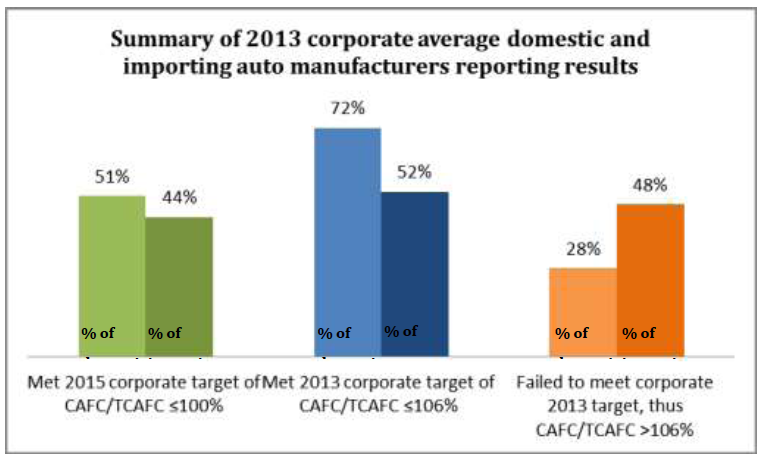News I iCET May Policy Brief: China's Fuel Economy Enforcement
Clean Transportation Program
Brief, May 19
Is China’s fuel economy gearing toward enforcement?
On May 5th, the Ministry of Industry and Information Technology (MIIT), which governs fuel economy implementation for passenger cars, published the list of auto manufacturers’ average corporate fuel consumption scores for the year 2013. The list introduces average fuel consumption data provided directly by the submitting companies (totaling 104), as well as a list of 7 manufacturers that failed to submit their corporate average fuel consumption data as required. The announcement is aimed at increasing transparency towards this year’s 106% average requirement from 2015 targeted 6.9L/100km. The announcement also serves as an official call for comments (due by June 7th).
As the data was self-reported by the companies and therefore not scrutinized, stay tuned for iCET’s 4th annual corporate fuel consumption analysis report coming this July. This year’s report, as did iCET’s previous corporate average fuel consumption reports, will provide a comprehensive analysis of trends by local producing types of companies, aimed at better equipping policy-makers and solutions providers with detailed and applicable market insight.
iCET’s initial analysis of data provided by MIIT shows that the average fuel consumption of Chinese-made passenger auto manufacturers was 7.22 L/100km, fulfilling 98.2% of the corporate average fuel consumption target of 7.35 L/100km for 2013. Out of the 79 domestic automakers, 51% fulfilled their corporate target requirements for 2015 (averaging 6.9L/100km, should no changes in vehicle production volumes and types occur), 72% achieved their 2013 annual compliance target (represented by 106% of the estimated 2015 corporate target) and 28% companies failed to meet their annual corporate average fuel consumption target (most of which are wholly-owned domestic manufacturers). Of the importing auto-companies that reported, 44% fulfilled the 2015 target requirements, 52% achieved the annual compliance target and as many as 48% of companies failed to meet their annual corporate average fuel consumption target.

This first MIIT announcement follows last year’s "Accounting Approach for Passenger Vehicle Corporate Average Fuel Consumption," which entered into force in May 2013. The accounting approach sets forth binding industry reporting requirements by which manufacturers must submit the average fuel consumption projections toward the coming calendar year by December 20, a half-year update by August 1st and an year-end final update by February 1st. The accounting approach does not specify penalties in case of lack, inadequate of false reporting, and do not provide specific enforcement measurements. Corporations that fail to report, or provide inadequate reporting, are subject to legal procedures under the court of law, however enforcement authority is not specified.
China’s fuel economy though may finally be growing teeth: on May 15 the MIIT announced that a working group led by its industry division and equipment department would inspect approval testing to ensure sound implementation of China’s third phase fuel consumption aimed at an average of 6.9L/100km by 2015. For the first time, the Ministry had officially announced that penalties would occur, however no specification of prices or process have been announced.